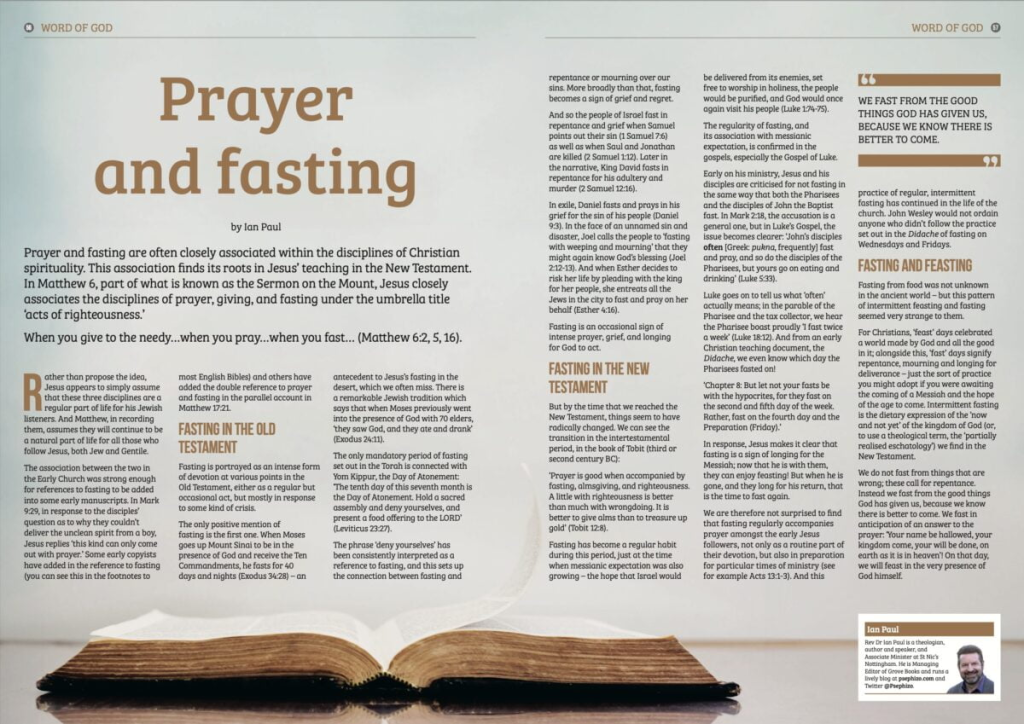We are going toward a corporate dynamic through our prayer lives, which are a response to His message and are bringing us in that direction. One of the most important aspects is the private nature in relation to God. Additionally, the prayer life ought to be guiding us toward a more communal and corporate nature within the context of the church’s life. The first step is to pray in private.
I am of the opinion that the power of fasting in relation to prayer is the spiritual equivalent of an atomic bomb that our Lord has bestowed upon us in order to destroy the strongholds of evil and to bring in a tremendous revival and spiritual harvest all across the world.

AIM OF FAST BACKGROUND
For a set time, Christians fast from food and drink to pray and fellowship with God. Fasting helps us grow closer to God and comprehend His divine and sovereign will, not to force Him to grant our pleas. We shouldn’t fast to force God to accomplish our will, but to do His.
Praying to God is fine. He encourages us and patiently accepts our prayers (Phil. 4:6). However, God loves us too much to bend to our will. Fasting helps us draw closer to God, surrender to His will, follow His guidance, and increase our resolve to obey His will. This is the best end we could hope for and rewards a few days of effort.
PURPOSES
- To improve prayer Fasting and intercessory prayer are linked in many Old Testament passages. Although fasting does not influence God’s response to prayer, it can change our requests. As Wallis states, “Fasting is calculated to bring a note of urgency and importunity into our praying and to give force to our pleading in the court of heaven.”
- SEEK GOD’S WILL Fasting to seek God’s counsel, like prayer, doesn’t change God but makes us more in tune with him.
- FOR DELIVERY OR PROTECTION Old Testament fasting was often for release from enemies or circumstances. Biblical fasting is usually done alongside other Christians.
- To repent and return to God This fasting expresses anguish over our faults and indicates our commitment to Christian obedience.
- To humble oneself before God “Remember that fasting itself is not humility before God,” he says, “but should be an expression of humility.”
- To love and worship God According to John Piper, fasting shows “what we hunger for most, we worship.”

Start your fast by doing the following:
- Set Your Objective: Define the purpose of your fast (e.g., spiritual renewal, guidance). Seek clarity from the Holy Spirit to focus your prayers.
- Make Your Commitment: Decide on the duration, type of fast, activity restrictions, and daily prayer time before starting to enhance commitment.
- Prepare Spiritually: Repentance is key. Create a list of sins, confess, seek forgiveness from others, make restitution, and surrender fully to Jesus Christ.
- Prepare Physically: Consult a physician if necessary, ease into fasting by eating smaller meals, and consume raw fruits and vegetables in the days leading up to the fast.
What I should and shouldn’t do when fasting
- A transactional mindset is not appropriate when dealing with sting; rather, it is about aligning oneself with God’s already-existing blessings rather than trying to earn them.
- Listen to your body; if fasting becomes overwhelmingly difficult, breaking the fast early is acceptable. Quality and sincerity during fasting are more important than duration.
- Break fasts gently; reintroduce food slowly to prevent discomfort and promote health, starting with light foods.
- Avoid self-condemnation for mistakes during fasting; repentance and continued commitment to faith are essential.
- Refrain from gossip and maintaining strife during fasting; conduct should reflect peace and righteousness.
- Increase prayer and worship during fasting; use time typically spent on food to connect more deeply with God.
- Engage in Bible study; this is a time to seek deeper understanding of scriptures rather than superficial reading.
- Cultivate a spirit of giving; reflect on God’s blessings and find ways to help others.
- Stay vigilant against temptations and distractions; cut down on social media and other diversions to maintain focus during fasting.
Examples of how to start a prayer

How to build a prayer life

Leave a Reply